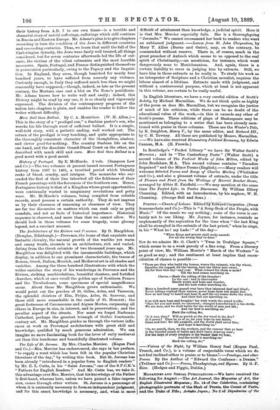POETRY. — Chants of Labour. Edited liYEdard Carpenter. (Swan Sonnenschein and Co.)—This
is "A Song-Book of the People, with Music." Of the music we say nothing; some of the verse is cer- tainly not to our liking Mr. Joynes, for instance, reminds us unpleasantly of the aspiration for the time when "the last King shall be strangled in the entrails of the last priest," when he sings, in his " What ho ! my Lads ! " of the da3r- . When Kings and priests shall make amends For all the wrong they've done."
Nor do we admire Mr. G. Clark's " 'Twas in Trafalgar Square," which seems to us a weak parody of a fine song. From a literary point of view, Mr. William Morris's "March of the Workers" is as good as any ; and the sentiment at least implies that recon- ciliation of lasses is possible :— " These are they who build thy houses, weave thy raiment, win thy wheat, Smooth° the rugged, fill the barren, tarn the bitter into sweet, All for thee this day—and ever. What reward for them is meet? Till the host comes marching on.
Chorus.—Hark the rolling of the thunder Lo the sun and lo thereunder Riaeth wrath and hope and wonder, And the host comes marching on.
Many a hundred yeara passed over have they laboured deaf and blind ; Never tidings reached their sorrow, never hope their toil might find. Now at last they've heard and hear it, and theory comes down the wind, And their feet arc marching on.
0 ye rich men hear and tremble!, for with words the sound Once for you and death we laboured ; changed henceforward is the snits.
We are men, and we shall battle for the world of men and, life;
And our host is marching on.'
Hark the rolling, ko.
Is it vrar, then Will ye perish as the dry wood in thefire L3 it peace P Then be ye of us, let your hope be our desire. Come and live! for life awaketh, and the world shall never tire; And hope is marching on.'
'On we march, then, we the workers, and the rumour that ye hear L3 the blended sound of battle and deity ranee drawing near; . For the hope et every creature is the banner that we boar, And the world is marching on.'
Hark the rolling, acc."
—Visions of the Night, by William Henry Seal (Kegan Paul, Trench, and Co.), is a volume of respectable verse which we do not feel inclined either to praise or to blame—Penelope, and other Poems. By the Author of "Edward the Confessor : a Drama." (Trtibuer and Co.)—Poems, Thanksgivings, and Hymns. By G. F. Rice. (Hodges and Figgis, Dublin.)


































 Previous page
Previous page